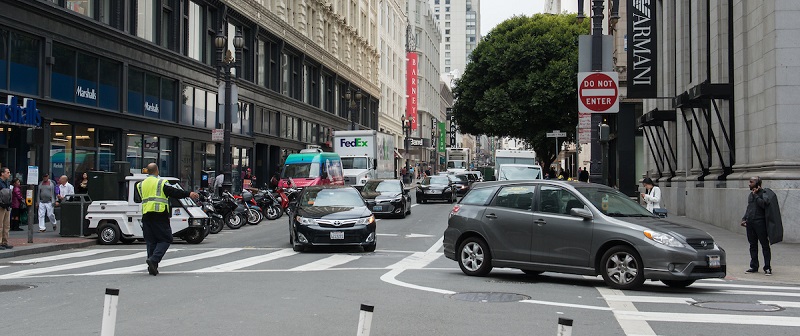
The San Francisco Municipal Transportation Agency and the City of San Francisco believe in a transportation system that serves everyone and SFMTA has a longstanding commitment to providing accessible transportation options for older adults and people with disabilities. Since 1978, long before paratransit was required by the Americans with Disabilities Act in 1990, the SFMTA has operated a paratransit program for people unable to use Muni, the City’s public transportation system. SFMTA has also made long-term investments in the accessibility of the Muni fixed route system, the local taxicab industry, and our local streets and sidewalks.
More recently, Transportation Network Companies (TNCs), particularly Lyft and Uber, have become an increasingly visible presence and part of the changing transportation landscape on San Francisco streets. According to data from 2016, approximately 170,000 TNC vehicle trips were estimated to occur within San Francisco during a typical weekday, representing approximately 15 percent of all weekday vehicle trips that both start and end within the city. A more recent study found that these trips account for approximately 50 percent of the increase in congestion in San Francisco between 2010 and 2016.
SFMTA’s recently released report, TNCs and Disabled Access, finds that the arrival of these emerging mobility services has expanded transportation options for some people with disabilities but it has not expanded options equally for all. For approximately 90,000 San Francisco residents with disabilities (almost 11 percent of the population) and an undetermined number of visitors with disabilities, TNCs may not be an option. While people with disabilities are more reliant on for-hire services and make twice the number of for-hire trips than non-disabled persons per year, they are more reliant on taxis. People with disabilities report taking twice as many taxi trips than TNC trips while overall there are approximately 12 times as many TNC trips as taxi trips during a typical weekday in San Francisco. A major barrier for wheelchair users is the lack of clear service requirements regarding wheelchair access in TNCs.
To better understand the impact of TNCs on disabled access to on-demand transportation, the report frames the need to understand existing obstacles and opportunities that TNCs in San Francisco pose to people with disabilities. The report is structured around four primary questions:
- What are transportation options for people with disabilities in San Francisco and how have these options been impacted by TNCs?
- How do TNCs serve people with disabilities?
- How are TNCs regulated and monitored to provide access to persons with disabilities?
- How are cities regulating and working with TNCs to improve access for people with disabilities?
The report notes that many of the benefits that have attracted riders to TNCs, such as ease of payment, cheaper fares, and shorter wait times, are not afforded equally to persons with disabilities. The rapid expansion of TNC services has also degraded the quality and availability of on-demand transportation access for riders who require a wheelchair accessible vehicle by upending the existing taxi industry. To maintain the availability of this important service, SFMTA has provided additional funding and incentives to drivers who own or operate accessible taxis.
Case studies explore how other dense urban cities are trying to improve access to TNCs for riders with disabilities. Recommendations outlined in the report highlight that improving disabled access to TNCs will require action across all sectors and places an emphasis on the implementation of Senate Bill 1376, the TNC Access for All Act (Hill). The bill, effective January 1, 2019, mandates the collection of a per-trip fee to support the provision of on-demand wheelchair accessible service and requires that benchmarks be developed to assure that measurable steps are being taken to improve TNC accessibility.